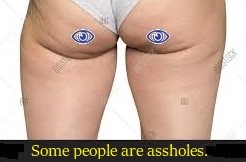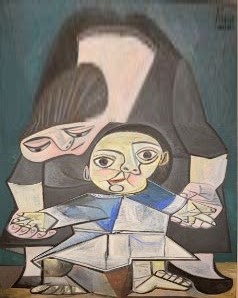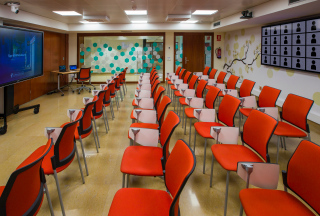More about "The Dark Continent" of childhood
"WE and YOU AND I [ / ] Are not the same thing [ / ] WE defeat the foe [ / ] But YOU defeat ME." (St. Bertolt of Brecht)
People say that a toddler, adventuring forth from his mother, keeps looking back for reassurance from his mother that everything is OK. This smells bad to me. The child needs to know that his mother "has his back", that if he gets in trouble his mother will protect and even rescue him. That makes sanse.
But what does it matter if his mother APPROVES of what he is doing or not? I think his parents extirpated his innate faculty of judgment extirpated so he does not know what HE "wants" to do, what he might autochthoously desire to do, but instead need to find out what they will want him to do if he is to keep them abandoning him (the omnipresent Or else!) → he needs to learn from his brainwashers what he is supossed to believe since he is not always smart enough to figure it out without them havng to tell him, which latter, of course, is the ideal because they generally do not like to be seenas benevolents, not as autocratic bullies.
What the mother should reply when hertoddler looks to her for guidance/ reassurace is: "What do YOU think of what you are doing? What I think is not important unless I see you maybe getting in trouble from dangers you are not old enough to have learned about. Then I will step in to make sure you are safe, so you can continue on your way. What's important is not what I think, but what YOU think, although I can give you my thoughts if you want them, and then, take them or leave them according to your cosidered judgment. I love you. Do your best."
Don't you agree, parent?
The only dissertation topic for me
We are a conversation (John Wild and others). Everything we can possibly THINK or a fortiori know is part of the conversation we are. If we try to get behind it we are still in it. Therefors it seems a primary topic for study is the conversation we are itself. And an objective for action is to support and further enhance it. Thus theory and parctice become one.
In college "philosophy" classes we read some of Mr. Plato's dialogues. I was not impresed by them. We discussed the content of the dialogues in 1h50m seminars with a dozen or so of us kids sitting around a table with the teach doing his thing. We had to write term papers and take afinal exam. What did we never rstudy? The conext of the dialoges and the context of what we were doing in the room. We weren't philosophizing so much as what I would call doing: "sophography": study of what some people thought was truth (or wisdom).
Did Mr Socrates have to publish to not perish? Did his acolytes have to do homework, write term paperand take a final exam? Not that I ever read, did you? We never reflected, in vivo, about the conversation we were. The very big invisible elephant in the very small room. And stupid me I was always running my mouth off trying to monopolize the conversation but never about it itself. I wou=der what would have happened had I called attention to the big invisible elephant?
A kind of existential a priori
I hypothesize that already in childhood, before there could be anything good in the or rather "my" world, I had a sense that everthing around me was "beneath me". I would not now cll it "subhuman" becaause the beasts are not al bestial like some humans are at least some of the time. This may make it more understandable that when the snack machine restock person came and threw out, I would forage for FREE EXPIRED DORITOS and retrive them from the garbage can. The other people may have felt the garbage was beneath them; I saw it as on the same level as everything else in the occice, so no differnce between digging for free Doritos then taking orders from and obeying my manager.
I think I saw everything, just like it was in space nd time, also in a kind of "place" that I wanted nothing to do with. If I was going to hav eto wash the dishes I always wanted to wash them before I ate the meal because the meal was fitting to me but washing the dishes not so I wanted to get that whic hws beneath me behind me so I would not hva to look ahead but not forward to it spoiling my meal; needless to say I wanted it to be behing me forever. today I call ot: pragmatic agenda" — waste. So, again, I try to make as little mess as possible because if I don't mess it up I can't have to clean it up.
I hypothesize I had the dimensional capability to experience a higher level of culture, spirit, whatever one wishes to call it from long before I ever encountered any person, place, thing or other that had a positive value on that axis, which first occurred when I met my freshman roomate at Yale who was an aristocratic young man (26 years old when I was 18 going on -8) and said he had grown up around persons like Albert Camus. Like a person with teo 20/20 eyes who always lived in total darkness. Well, that is not quite true: I had sometimes looked thru copies of Doums magazine in a reading room inBaltimore's Enoch Pratt Free Library library and the pstures were of a different world than I was stuck in. Rrose Sélavy.

 Welcome
Welcome

